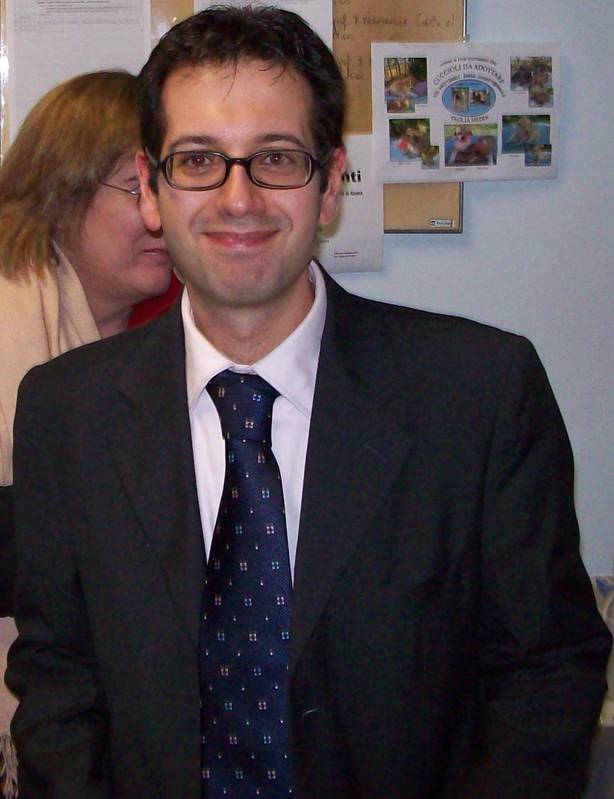You are currently viewing this course as Guest.
Andrology II - Prof. Arcangelo Barbonetti - a.y. 2021/2022
Reproductive Biotechnologies - 2nd year
 ATTENZIONE: i contenuti di questo corso sono relativi all'anno accademico 2021/2022
ATTENZIONE: i contenuti di questo corso sono relativi all'anno accademico 2021/2022
Topic outline
-
 1978. Born in L’Aquila, May 31
1978. Born in L’Aquila, May 31
2003. Degree MD at Medical School University of L’Aquila
2008. Postgraduate degree in Endocrinology and Metabolic Diseases at University of L’Aquila
2010. Certified clinical andrologist of the European Academy of Andrology (EAA)
2012. PhD degree in Internal Medicine and Applied Immunology at University of L’Aquila
Affiliation to Scientific Societies
- European Academy of Andrology (EAA)
- Italian Society of Andrology and Sexual Medicine (SIAMS): member of Scientific Committee from 2015 to 2016; coordinator of SIAMS Newsletter Committee from 2013 to 2016; coordinator of SIAMS Committee for clinical-scientific updating.
- Italian Society of Endocrinology (SIE)
- Spinal Cord Italian Society (SIMS)
Main research fields
Sperm physiology
Male infertility
Sexual medicine
Andrology of spinal cord injury
INFO ABOUT THE COURSE
OBJECTIVES OF THE COURSE- Knowledge and understanding: The course aims to provide specific knowledge about: 1) pathophysiology and clinical issues of male infertility; 2) diagnostic approach to male infertility and evaluation of the male contribution to couple sub-fertility on the basis of semen analysis for the assessment of male fertility potential; 3) sperm morpho-functional integrity tests in basic and clinical research; 4) role of oxidative stress in male sub-fertility; 5) male indications, sperm processing techniques and testicular sperm recovery for assisted fertilization procedures; 6) male immunological infertility; 7) reasons and methods for cryopreservation of sperm.
- Applying knowledge and understanding: At the end of the course, an oral examination will evaluate the student ability to describe and critically discuss any acquired knowledge. Final examination also will allow the appraisal of the student ability to correctly use theoretical/practical knowledge in laboratory diagnosis of male infertility, in sperm processing for assisted fertilization procedures and in basic/clinical research in the field of reproductive medicine.
- Making judgements: The student ability to plan and interpret results of laboratory assays for assessing male fertility potential in clinical settings and for evaluating sperm functional integrity in experimental setting will be appraised.
- Communication: The student ability to clearly and effectively discuss the acquired knowledge will be appraised both during oral examination and laboratory activities, which will be carried out under the tutorship of the teacher and specialized technical staff. Written communication skills will be appraised during the preparation of the final thesis project.
- Learning skills: Students have to develop learning ability to undertake subsequent post-degree studies (e.g. PhD) and working experiences (e.g. stages, employment contract). The course organization, including theory lessons followed by practical laboratory activities, allows the student to immediately move the theoretical knowledge to its application context and to acquire a scientific methodology for both research and working post-degree experiences. Furthermore, the elaboration of an experimental thesis, will allow the student to autonomously search for bibliography information and to select and critically evaluate any scientific report in order to develop novel experimental hypotheses.
PREREQUISITE AND PREPARATORY- Prerequisite: Physiology of the human reproduction.
- Preparatory: Andrology I examination.
DUBLIN DESCRIPTORS FOR UNIT
UNIT 1:- Knowledge and understanding: The course aims to provide specific knowledge about: 1) pathophysiology and clinical issues of male infertility; 2) diagnostic approach to male infertility and evaluation of the male contribution to couple sub-fertility on the basis of semen analysis for the assessment of male fertility potential; 3) sperm morpho-functional integrity tests in basic and clinical research; 4) role of oxidative stress in male sub-fertility; 5) male indications, sperm processing techniques and testicular sperm recovery for assisted fertilization procedures; 6) male immunological infertility; 7) reasons and methods for cryopreservation of sperm.
- Applying knowledge and understanding: At the end of the course, an oral examination will evaluate the student ability to describe and critically discuss any acquired knowledge. Final examination also will allow the appraisal of the student ability to correctly use theoretical/practical knowledge in laboratory diagnosis of male infertility, in sperm processing for assisted fertilization procedures and in basic/clinical research in the field of reproductive medicine.
- Making judgements: The student ability to plan and interpret results of laboratory assays for assessing male fertility potential in clinical settings and for evaluating sperm functional integrity in experimental setting will be appraised.
- Communication: The student ability to clearly and effectively discuss the acquired knowledge will be appraised both during oral examination and laboratory activities, which will be carried out under the tutorship of the teacher and specialized technical staff. Written communication skills will be appraised during the preparation of the final thesis project.
- Learning skills: Students have to develop learning ability to undertake subsequent post-degree studies (e.g. PhD) and working experiences (e.g. stages, employment contract). The course organization, including theory lessons followed by practical laboratory activities, allows the student to immediately move the theoretical knowledge to its application context and to acquire a scientific methodology for both research and working post-degree experiences. Furthermore, the elaboration of an experimental thesis, will allow the student to autonomously search for bibliography information and to select and critically evaluate any scientific report in order to develop novel experimental hypotheses.
COURSE BOOKS
WHO laboratory manual for the Examination and processing of human semen- Author: WHO
- Edition: 5th Edition, WHO Press, 2010, Geneva
Andrology. Male reproductive health and dysfunction- Author: Nieschlag E, Behre HM, Nieschlag S
- Edition: 3rd Edition, Springer-Verlag Berlin Heidelberg, 2010
Infertility: Immunological Aspects- Author: Francavilla F, Barbonetti B
- Edition: eLS. John Wiley & Sons, 2012, Chichester
FINAL TESTDate:
EVALUATION
Voto in trentesimi mediante esame orale.
-
-
-
-
-
-
-
-
-